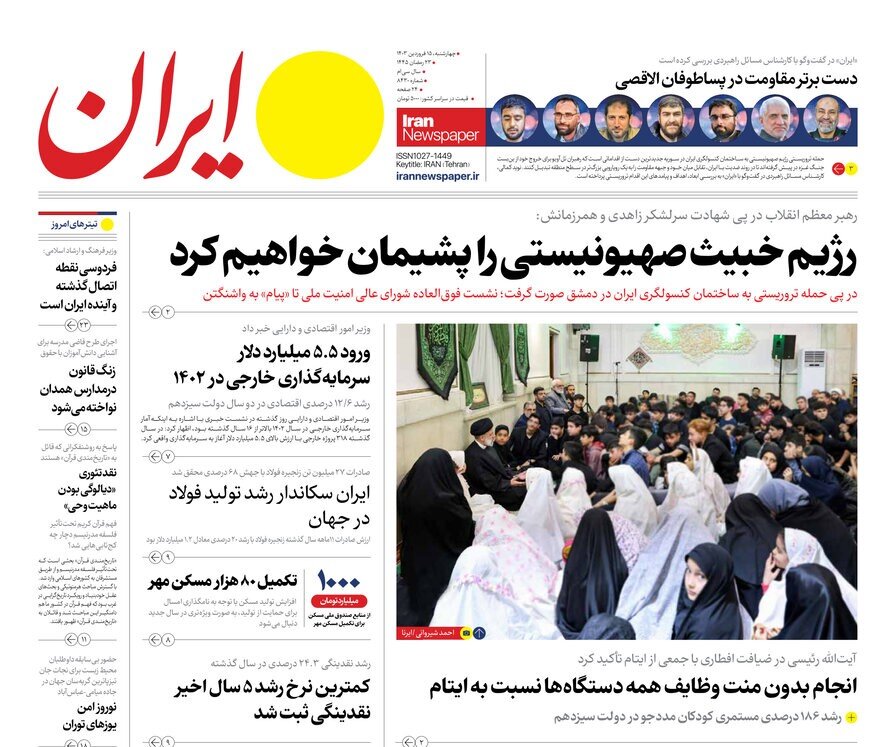We will make them regret

TEHRAN - In a note, the Iran newspaper addressed the terrorist attack on the Iranian consulate building in Damascus by the Zionist regime and said: With this barbaric act, it seems that the leaders of Israel are at the end of their political life, because in their opinion, by spreading the scope of the war to the surrounding environment, they will burn Iran and the Middle East in the flames of this crisis.
The regional and international countries are condemning one after another the terrorist attack by Israel against the diplomatic mission of Iran but the United States, as a country that has backed Israel since the beginning of the Gaza war and has seen no reason to prevent the continuation of its bloody attacks, claimed that it did not know about the terrorist attack on April 1. A U.S. official said that we were not given any details based on what Israel told us and that it reported the attack when its military jets were flying in the air. In any case, whether or not Washington is aware of Israel's intention to carry out this action, that does not affect the direct responsibility of America for this crime and its consequences.
Shargh: Iran facing the dilemma of rational response or tough response
In an analysis, Shargh dealt with the issue of Iran's reaction after the Israeli terrorist attack and wrote: The occupiers were trying to make the Islamic Republic of Iran quickly enter an emotional atmosphere and a suicidal reaction with this attack. Therefore, Tehran should determine and choose the level, intensity and type of reaction, as well as its time and place, based on the requirements arising from national interests and security. The use of diplomatic and legal tools such as the use of pressure levers in the UN Security Council can be among the first steps to make the Zionist regime answer about this act. Benjamin Netanyahu and the radical right-wing parties that support him are now not only seeking to expand the war and direct conflict with Iran, but on a larger level, they are also trying to drag the United States of America into a war in the Middle East. For this reason, the country's authorities must have a completely accurate, deep and comprehensive evaluation regarding the Israeli attack on the Iranian consulate in Syria.
Ham Mihan: Israel's attack does not show its power, but it was because of desperation
In an interview with Jafar Ghannadbashi, an expert on Middle East issues, Ham Mihan discussed the causes of Israel's attack on the Iranian consulate in Damascus and said: If we analyze the Zionist regime, we will get the reasons and motivations for this attack. According to some officials, Israel's conditions have sounded the alarm of the collapse of the Zionist government. They even indirectly threatened to use nuclear weapons if the Zionist government was threatened. Therefore, they are stuck in a very difficult deadlock. One of Israel's strategies is to try to reduce Iran's power, which should be taken into consideration. According to them, the removal of every active and capable member of Iran is the reduction of Iran's power and the resistance front in the region. But Iran will not enter the field considered by Israel. The Israelis want Iran to show a reaction that is in their favor, but just as Iran has acted rationally in the past six months during the war in Gaza, it will behave wisely at this time as well. Iran's reaction will be such that Israel will not be able to make excuses.
Farhikhtegan: Gaza war and the strategic value of Tehran-Riyadh relations
In a commentary, Farhikhtegan discussed the closeness of Tehran-Riyadh relations after the start of the Gaza war and said: The Gaza war is a good opportunity to increase the strategic value of the two countries in the global equations by promoting "regional diplomacy." The Al-Aqsa storm operation has not led to the spread of a regional war, at least so far. Interestingly, the relations of Arab countries, especially Saudi Arabia, have become even closer with Iran. The main reason is related to the adoption of smart policies by Tehran and Riyadh in the face of the Gaza war and their emphasis on an immediate ceasefire and then resorting to regional solutions to achieve a stable and just peace between the two conflicting parties. One of the most important reasons for the closeness of Iran and Saudi Arabia in the Gaza war is the comprehensive support of the U.S. to the Israeli regime in this war at the cost of weakening its strategic relations with its Arab allies in the region. The comprehensive support of the United States to Israel in the Gaza war has led to a change in the pattern of Saudi foreign policy towards Iran from the "deterrence" approach to the "cooperation and dialogue" approach. This is an important strategic development in terms of strengthening regional diplomacy.
